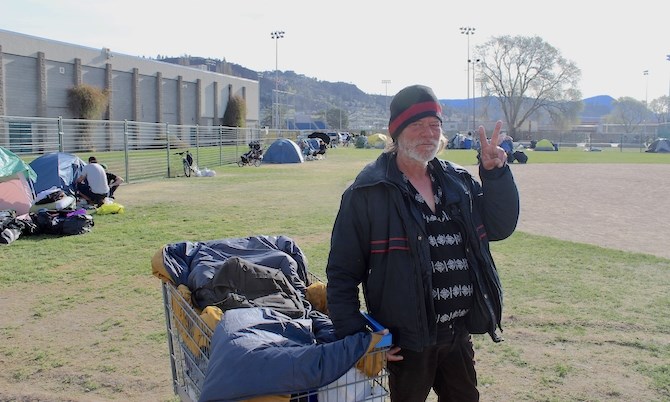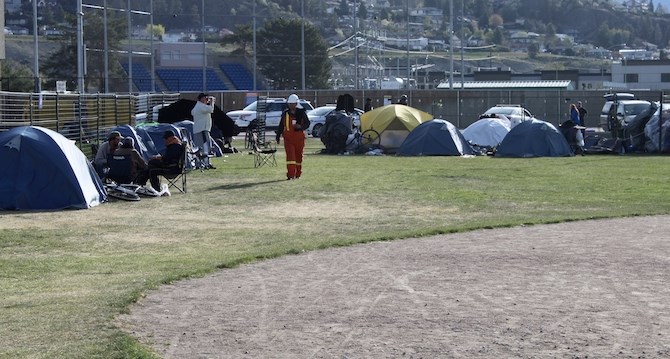
Dano is sleeping out of doors at Recreation Avenue in Kelowna which seems to lower the risk of COVID-19.
(ROB MUNRO / iNFOnews.ca)
April 23, 2020 - 6:30 AM
An estimated 150 people are sleeping in tents or doorways in Kelowna this spring but they don’t seem to be catching the COVID-19 virus even though they may not excel at social distancing.
That number is an estimate given by Welcome Inn manager Jason Siebenga. The Welcome Inn, which provided beds during the winter, is now a hygiene centre with showers and laundry for homeless people who are not in existing shelters.
Last week, 111 different people accessed its services. Each one was given a basic health check, questioned about cough and fever then had their temperatures taken. There was only one person who staff members had concerns about so they checked with Interior Health and the person was fine, Siebenga said.
“Now, with the weather being nicer, outdoors is not where most of the viruses are spread,” Interior Health Medical Health Officer Dr. Silvina Mema told iNFOnews.ca. “The sun kills the virus very quickly. (Homeless sleeping rough) may be protected somehow because we’ve not seen any outbreaks really, among the homeless, even in the Downtown Eastside or in Alberta. They seem to be spared, somehow, which is great.”
Not only does outdoor living seem helpful, the homeless are not often in contact with people who have travelled to other countries or people in long term care homes where most of the outbreaks have occurred.
The city’s two indoor shelters – Gospel Mission and Cornerstone – have reduced the number of beds they provide and check those staying there as well.
Mema did mention, however, that a study out of Boston last week found that 36 per cent of 400 people living in a homeless shelter tested positive for COVID-19. They were not coughing, showing signs of a fever or shortness of breath more than those who tested negative.
"I would be very interested to do something like that — to test broadly," Mema said.
"But, at the same time, what are we going to do if we find positive cases? We need a plan. Where would we put them? There are implications of doing that."
One long-term homeless man who slept overnight at Recreation Avenue had another explanation for COVID-19 not seeming to be a problem.
“It doesn’t like the amount of alcohol I drink,” joked Dano, who didn’t want to give his last name.
His complaints about the impact of COVID-19 had to do with the fact that he bought a bus pass just before rides were offered for free plus he bemoaned the cancellation of the outdoor piano program where he often played.

Sometimes more than 50 people are camped out at Recreation Park in Kelowna, many in tents provided by B.C. Housing.
(ROB MUNRO / iNFOnews.ca)
There was an average of 43 people sleeping at the Recreation Avenue site so far in April, although the numbers ranged from about 20 to more than 50, City of Kelowna Community Safety Director Darren Caul said.
More than 50 are allowed by provincial health authorities because they are not classified as a large group gathering together for something like a concert, he said.
B.C. Housing provided two-person tents and other camping equipment to single people, three-person tents to couples and the camping area has been expanded to create better spacing.
Caul pointed out that the city has to provide a place for people to camp if there aren’t enough indoor spaces.
Last winter, the city provided storage space for tents and personal gear at Recreation Avenue but since less is needed in the summer, campers had to pack their tents up each day and take them along as they travelled about.
Siebenga is looking for donations of large backpacks to help them with that. Contact-free drop-offs can be arranged at the Welcome Inn.
The fact that an average of only 43 people camp there means that there are 50 to 100 other people sleeping rough in other parts of the city.
Bylaw officers are no longer actively seeking out and closing down illegal camp spots, just responding to complaints or dealing with dangerous situations like fire hazards, Caul said.
To contact a reporter for this story, email Rob Munro or call 250-808-0143 or email the editor. You can also submit photos, videos or news tips to the newsroom and be entered to win a monthly prize draw.
We welcome your comments and opinions on our stories but play nice. We won't censor or delete comments unless they contain off-topic statements or links, unnecessary vulgarity, false facts, spam or obviously fake profiles. If you have any concerns about what you see in comments, email the editor in the link above.
News from © iNFOnews, 2020